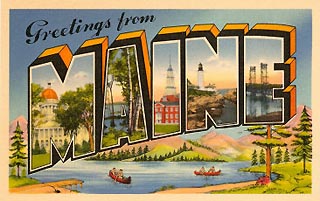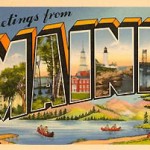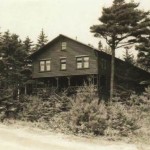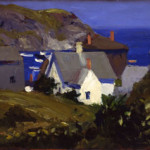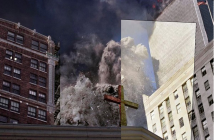A LETTER FROM THE ROAD
For the last few days, my wife and I have been traveling up the coast of Maine, hitting all the shopping towns along the way: Portland, Freeport, Boothbay Harbor. We are unabashedly tourists, looking at every lobster-shaped trinket and moose emblazoned doodad. Yesterday we ate lobster for every meal, just because we could.
Passing through all of these tourist trap towns, we have seen a lot of art. I mean, a LOT of art, and at first I didn't pay too much attention. I see art every day, teaching at AIB or checking out the galleries, working on Big RED & Shiny... perhaps I've gotten a little numb to the kind of impact art can have. Add to that the attraction of the newest thing, the bigger idea, and the endless distraction of the art market, and somehow it's easy to overlook a watercolor of a sunset.
That is what vacation is for, I now realize, to take you away from your little world and help you see things in a new way. In my case, it was to help be find beauty in a simple painting of a lobster boat, and not worry about its place in the larger contemporary landscape. There is a joy in the making of work like this, of simply taking in the world and making something of it, anything at all. I've never wanted to be a Sunday painter, but suddenly feel the urge.
The feature exhibition at the Portland Museum of Art is titled "Call Of The Coast: Art Colonies Of New England" and it has set the tone for this trip. The paintings in the show were created at a number of artist colonies along the coast, from Connecticut to Maine, and are mostly landscapes and seascapes of familiar subjects. Yet, the idea that artists with New York careers would gravitate to these colonies to paint these scenes ties them together in an interesting way.
In the tourist trap galleries, there are lot of similar images, small paintings of fishing boats and seascapes, the occasional lobster or woodland scene. Some are better than others, of course, but looking out the window at the sunny harbor, it's easy to understand the appeal of this work, the need of the artist to capture the beauty of the scene and the desire of a person to own that captured moment. It's not about postmodern philosophy or the concerns of any academic or curator, only the need to share beauty.
None of this is a new realization, it is why I wanted to be an artist in the first place, but it is nice to be reminded. The art colonies may be gone, but there is still some camaraderie in these paintings and sculptures, a tie to a past and the idea that art is about community as much as it is about sales or theories.
As I write this, I am at the Sprucewold Lodge, which was once a log cabin colony in Boothbay Harbor. I should say "is" a log cabin colony, as it still functions that way, but the place is mostly empty and there are only a few people around. There is no internet, no television in our room, and I'm left to think about those art colonies of the past, the solitude and the beauty that went into the work that was created there. The floorboards of this lodge practically creak with the footsteps of artists past, climbing the stairs to tell their friends about a new work, an inspiration, a turn of phrase or secret spot where the light is just right. They are still here, I think.
Vacations are a time to decompress, relax and re-sync your world view. For the rest of this trip, my inner art critic is on vacation too. Back in Boston, there will be press releases to read and the latest info from the galleries to catch up on, but here I am happy to know, to truly understand, why those artworks I often ignore are remade over and over again by countless artists. They are scenes shared by so many, beautiful in a way that you want to keep them forever, to have something to hold on to when your vacation is over.
- One of the main buildings of the Sprucewold Lodge, 1927
- Edward Hopper, Monhegan Houses, Maine, oil on panel, circa 1916.
The Portland Museum of Art
The Sprucewold Lodge
"Call of the Coast: Art Colonies of New England" is on view June 25, 2009 - October 12, 2009 at PMA.
Postcard image found via Google.
Sprucewold image from the collection of the Boothbay Historical Society, via "Rusticators In Sprucewold," Mary K. Otto, editor.
Hopper image courtesy of the Portland Museum of Art.

